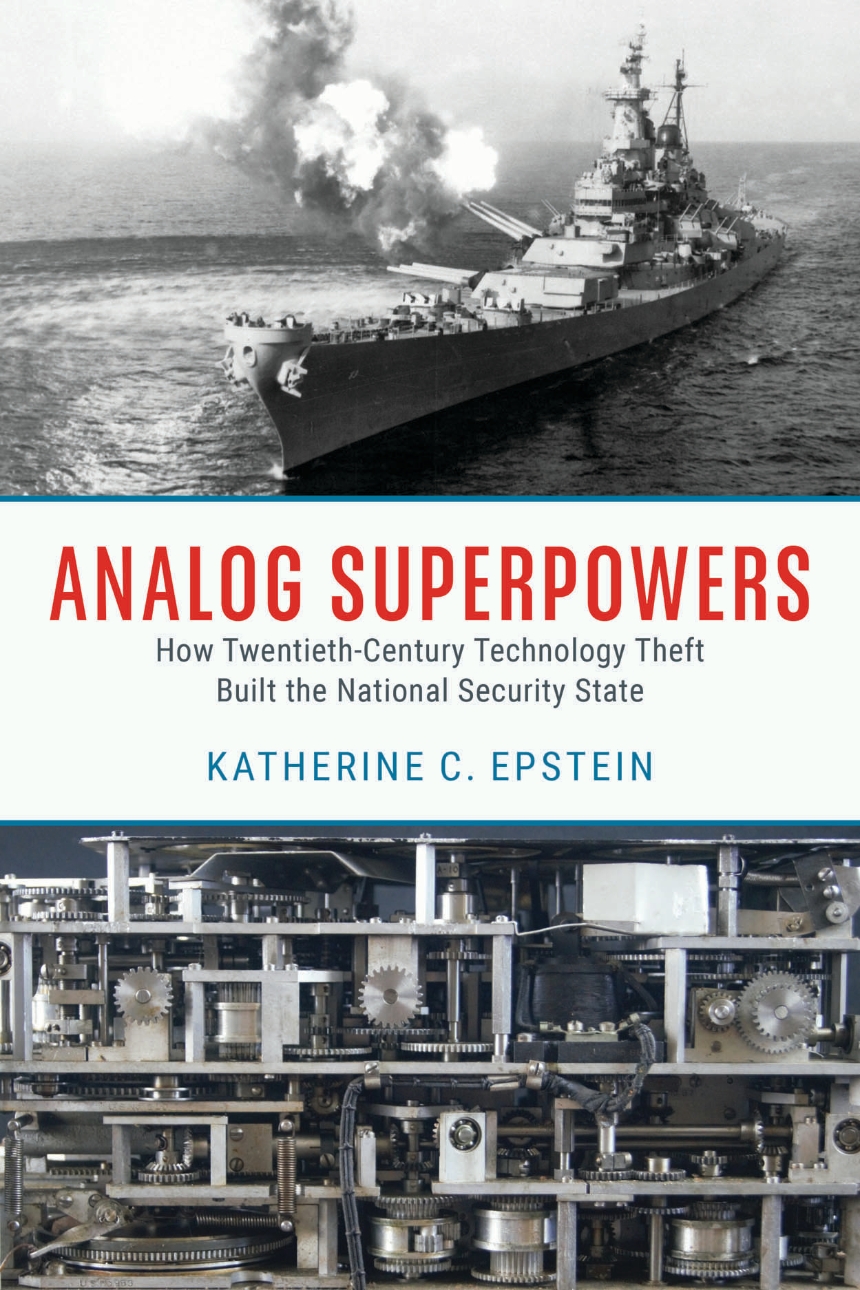Analog Superpowers
How Twentieth-Century Technology Theft Built the National Security State
9780226831220
9780226831237
Analog Superpowers
How Twentieth-Century Technology Theft Built the National Security State
A gripping history that spans law, international affairs, and top-secret technology to unmask the tension between intellectual property rights and national security.
At the beginning of the twentieth century, two British inventors, Arthur Pollen and Harold Isherwood, became fascinated by a major military question: how to aim the big guns of battleships. These warships—of enormous geopolitical import before the advent of intercontinental missiles or drones—had to shoot in poor light and choppy seas at distant moving targets, conditions that impeded accurate gunfire. Seeing the need to account for a plethora of variables, Pollen and Isherwood built an integrated system for gathering data, calculating predictions, and transmitting the results to the gunners. At the heart of their invention was the most advanced analog computer of the day, a technological breakthrough that anticipated the famous Norden bombsight of World War II, the inertial guidance systems of nuclear missiles, and the networked “smart” systems that dominate combat today. Recognizing the value of Pollen and Isherwood’s invention, the British Royal Navy and the United States Navy pirated it, one after the other. When the inventors sued, both the British and US governments invoked secrecy, citing national security concerns.
Drawing on a wealth of archival evidence, Analog Superpowers analyzes these and related legal battles over naval technology, exploring how national defense tested the two countries’ commitment to individual rights and the free market. Katherine C. Epstein deftly sets out Pollen’s and Isherwood’s pioneering achievements, the patent questions raised, the geopolitical rivalry between Britain and the United States, and the legal precedents each country developed to control military tools built by private contractors.
Epstein’s account reveals that long before the US national security state sought to restrict information about atomic energy, it was already embroiled in another contest between innovation and secrecy. The America portrayed in this sweeping and accessible history isn’t yet a global hegemon but a rising superpower ready to acquire foreign technology by fair means or foul—much as it accuses China of doing today.
At the beginning of the twentieth century, two British inventors, Arthur Pollen and Harold Isherwood, became fascinated by a major military question: how to aim the big guns of battleships. These warships—of enormous geopolitical import before the advent of intercontinental missiles or drones—had to shoot in poor light and choppy seas at distant moving targets, conditions that impeded accurate gunfire. Seeing the need to account for a plethora of variables, Pollen and Isherwood built an integrated system for gathering data, calculating predictions, and transmitting the results to the gunners. At the heart of their invention was the most advanced analog computer of the day, a technological breakthrough that anticipated the famous Norden bombsight of World War II, the inertial guidance systems of nuclear missiles, and the networked “smart” systems that dominate combat today. Recognizing the value of Pollen and Isherwood’s invention, the British Royal Navy and the United States Navy pirated it, one after the other. When the inventors sued, both the British and US governments invoked secrecy, citing national security concerns.
Drawing on a wealth of archival evidence, Analog Superpowers analyzes these and related legal battles over naval technology, exploring how national defense tested the two countries’ commitment to individual rights and the free market. Katherine C. Epstein deftly sets out Pollen’s and Isherwood’s pioneering achievements, the patent questions raised, the geopolitical rivalry between Britain and the United States, and the legal precedents each country developed to control military tools built by private contractors.
Epstein’s account reveals that long before the US national security state sought to restrict information about atomic energy, it was already embroiled in another contest between innovation and secrecy. The America portrayed in this sweeping and accessible history isn’t yet a global hegemon but a rising superpower ready to acquire foreign technology by fair means or foul—much as it accuses China of doing today.
368 pages | 20 halftones, 1 tables | 6 x 9 | © 2024
History: American History, British and Irish History, History of Technology, Military History
Law and Legal Studies: Legal History
Reviews
Table of Contents
List of Illustrations
Note on British and American Naval Administration
Introduction: Naval Fire Control as Beach Reading
1. Invention as Authorship
2. Infringement as Plagiarism
3. Official Secrets
4. Westward the Course of Piracy Makes Its Way
5. Secret Patents and the Pax Britannica
6. Breaking Up Is Hard to Do
7. Clocking the Crown
8. Inside the Military-Industrial Complex
9. Outside the Military-Industrial Complex
10. State Secrets and the Pax Americana
Conclusion: Everything Old Is New Again
Acknowledgments
List of Abbreviations
Notes
Sources
Index
Note on British and American Naval Administration
Introduction: Naval Fire Control as Beach Reading
1. Invention as Authorship
2. Infringement as Plagiarism
3. Official Secrets
4. Westward the Course of Piracy Makes Its Way
5. Secret Patents and the Pax Britannica
6. Breaking Up Is Hard to Do
7. Clocking the Crown
8. Inside the Military-Industrial Complex
9. Outside the Military-Industrial Complex
10. State Secrets and the Pax Americana
Conclusion: Everything Old Is New Again
Acknowledgments
List of Abbreviations
Notes
Sources
Index
